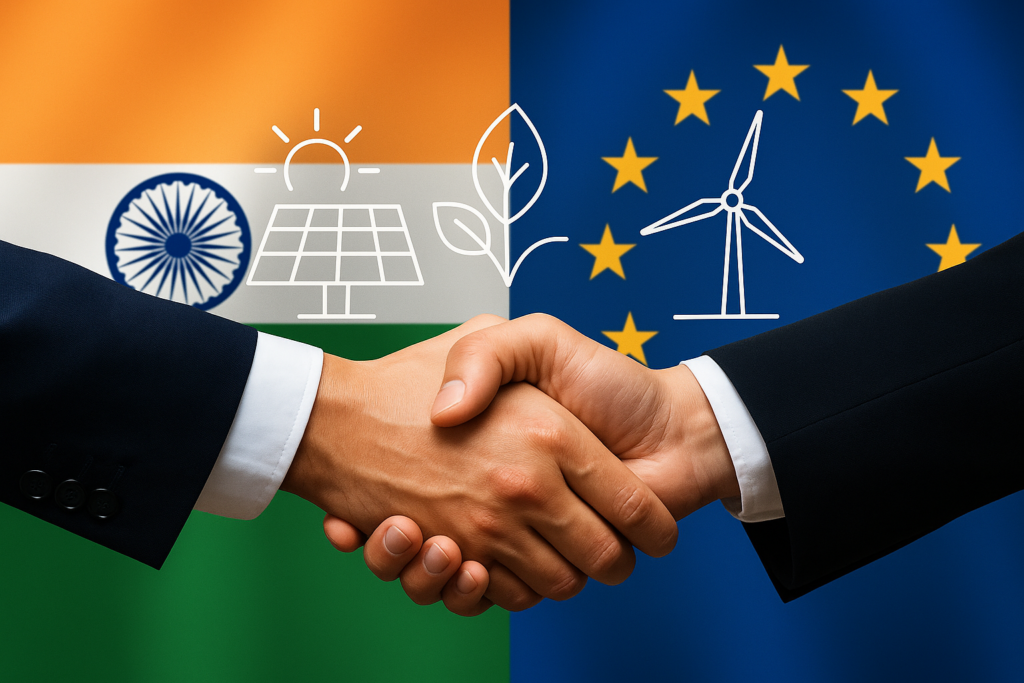Highlight 44/2025: India–EU Cooperation on Sustainable Development: From Trade to Green Transition
Adhitheya Jyothi Saravanan, 12 November 2025

The partnership between India and the European Union has evolved from a trade-oriented relationship into a multidimensional alliance grounded in sustainability, digital innovation, and green growth. As both sides navigate the twin imperatives of economic development and ecological responsibility, their collaboration offers a model for equitable global governance rooted in shared democratic values and multilateralism (European Commission & HRVP, 2025).
Historically, India–EU cooperation was structured around aid and poverty alleviation. With India’s graduation to a middle-income economy, the relationship shifted toward a global development partnership under the 2030 Agenda and the Paris Agreement (Paulo, 2019). The Observer Research Foundation argues that this transition marks a move “from aid to partnership,” emphasizing co-ownership and mutual accountability within the Sustainable Development Goals (SDGs). The EU–India Strategic Partnership formalized this transformation, embedding sustainability across trade, technology, and foreign policy. The 2025 Joint Communication on a New Strategic EU–India Agenda further reaffirmed that the two democracies are “natural strategic partners” committed to aligning prosperity with sustainability.
At the heart of this cooperation lies the EU–India Clean Energy and Climate Partnership (CECP), launched in 2016 and renewed under the Roadmap to 2025. It focuses on renewable energy, energy efficiency, and climate adaptation. According to the EU–India Climate Cooperation Brief (2023), India has already achieved 169 Gigawatt of installed renewable capacity, moving toward its target of 450 GW by 2030 (CAN Europe & CAN South Asia, 2023). However, challenges persist. The EU’s Carbon Border Adjustment Mechanism (CBAM) part of the European Green Deal has raised concerns in India about “green protectionism”, meaning the use of climate policies as indirect trade barriers that may disproportionately affect developing economies’ exports and overall competitiveness. Ongoing technical dialogues between Brussels and New Delhi therefore aim to achieve mutual recognition of sustainability standards, ensuring that carbon measures promote cooperation rather than contention. The 2021 EU–India Leaders’ Meeting reaffirmed commitments to gender equality and just transitions, emphasizing that energy partnerships must uphold social justice.
The EU–India Connectivity Partnership (2020), incorporated within the Global Gateway Strategy, ties together sustainability, infrastructure, and finance. The partnership promotes transparent and climate-resilient investments in digital, transport, and energy networks, ensuring a “level playing field for economic operators” . Projects such as SUNREF Green Housing India, CITIIS 2.0, and Mobilise Your City co-financed by the EU, AFD, and KfW illustrate how blended finance can foster urban sustainability, affordable housing, and low-carbon transport. These initiatives align with India’s Smart Cities Mission and its National Green Hydrogen Mission, creating synergies between European capital and Indian climate ambition. The Global Gateway aims to mobilize €300 billion globally between 2021 and 2027, using de-risking instruments to attract private investment.
Despite strong progress, cooperation faces asymmetries in carbon pricing, technology transfer, and finance. To deepen trust, both sides must institutionalize multi-stakeholder dialogues and expand the scope of the India–EU Green Partnership toward policy co-creation. As the Joint Communication on a New Strategic Agenda underscores, prosperity and sustainability must “advance hand in hand” through coordinated trade, innovation, and climate action. If effectively realized, the India–EU partnership could emerge as a blueprint for equitable global climate diplomacy, bridging North–South divides and redefining what it means to grow sustainably in the 21st century.
Adhitheya Jyothi Saravanan, Highlight 44/2025: India–EU Cooperation on Sustainable Development: From Trade to Green Transition, 12 November 2025, available at www.meig.ch
The views expressed in the MEIG Highlights are personal to the authors and neither reflect the positions of the MEIG Programme nor those of the University of Geneva.
